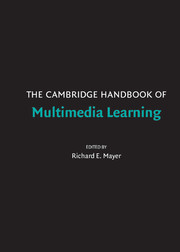Book contents
- Frontmatter
- Contents
- Preface
- Contributors
- 1 Introduction to Multimedia Learning
- PART I THEORETICAL FOUNDATIONS
- PART II BASIC PRINCIPLES OF MULTIMEDIA LEARNING
- PART III ADVANCED PRINCIPLES OF MULTIMEDIA LEARNING
- PART IV MULTIMEDIA LEARNING IN CONTENT AREAS
- 23 Multimedia Learning of Reading
- 24 Multimedia Learning of History
- 25 Multimedia Learning of Mathematics
- 26 Multimedia Learning of Chemistry
- 27 Multimedia Learning of Meteorology
- 28 Multimedia Learning About Physical Systems
- 29 Multimedia Learning in Second Language Acquisition
- 30 Multimedia Learning of Cognitive Skills
- PART V MULTIMEDIA LEARNING IN ADVANCED COMPUTER-BASED CONTEXTS
- Author Index
- Subject Index
- References
23 - Multimedia Learning of Reading
Published online by Cambridge University Press: 05 June 2012
- Frontmatter
- Contents
- Preface
- Contributors
- 1 Introduction to Multimedia Learning
- PART I THEORETICAL FOUNDATIONS
- PART II BASIC PRINCIPLES OF MULTIMEDIA LEARNING
- PART III ADVANCED PRINCIPLES OF MULTIMEDIA LEARNING
- PART IV MULTIMEDIA LEARNING IN CONTENT AREAS
- 23 Multimedia Learning of Reading
- 24 Multimedia Learning of History
- 25 Multimedia Learning of Mathematics
- 26 Multimedia Learning of Chemistry
- 27 Multimedia Learning of Meteorology
- 28 Multimedia Learning About Physical Systems
- 29 Multimedia Learning in Second Language Acquisition
- 30 Multimedia Learning of Cognitive Skills
- PART V MULTIMEDIA LEARNING IN ADVANCED COMPUTER-BASED CONTEXTS
- Author Index
- Subject Index
- References
Summary
Abstract
Addressing how multimedia learning intersects with teaching reading and learning to read entails unique challenges when compared to other school subjects. Those challenges spring from the prominent place that reading instruction occupies in the school curriculum and in daily life. As the first of the three Rs, learning to read is foundational to all school subjects. Further, the ability to read and comprehend textual information is integral to all schooling and indeed to living a productive and fulfilling life in developed areas of the world (Brandt, 2001).
Introduction
In part because the stakes are high and in part because reading is an intriguingly complex cognitive activity, the teaching and learning of reading have historically attracted attention from diverse disciplines. The literature pertaining to reading is an interdisciplinary amalgam including not only mainstream scholars of reading pedagogy, but also educational researchers in other curricular areas, psychologists of every stripe, sociologists, historians, philosophers, and even those in the medical field such as ophthalmologists. The appearance of multimedia forms of communication made possible by computer technology has reinforced and extended the interdisciplinary mix to include scholars in fields such as journalism and mass media, library science, instructional design, and computer science.
Further, because a citizenry's collective reading achievement is perceived to have important economic and political consequences, reading pedagogy and the scholarly work that informs it are almost daily in the public eye.
- Type
- Chapter
- Information
- The Cambridge Handbook of Multimedia Learning , pp. 355 - 374Publisher: Cambridge University PressPrint publication year: 2005
References
- 11
- Cited by

